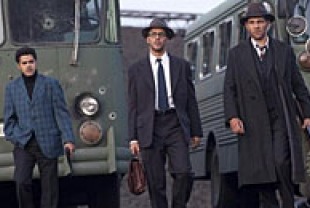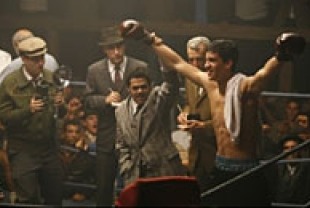Algeria, 1925: a farmer who has tilled the same soil that his father and grandfather worked is told that he must hand over his land to France. Twenty years later: Europe is liberated after World War II and many Algerians take to the streets of Setif to make clear their demand for national independence. The French police open fire and kill many peaceful demonstrators. Among those who are killed is the farmer from the opening scene of the film. His three sons, still remembering the loss of their beloved land, respond in different ways to resisting the French violence and injustice.
Abdelkader (Sami Bouajila) has served time in prison, watched compatriots being executed, all the while nurturing a zealous commitment to the revolutionary FLN (Front de Libération Nationale) movement. As a leader, he works around the clock and has no private life. He sets high standards for those involved in the movement. When a family man admits to stealing funds to purchase a refrigerator, he is executed on Abdelkader's orders. He enlists the aid and support of his brother Messaoud (Roschdy Zem), an intense man who has served as a soldier in the French army fighting in Indochina. Messaoud marries and has a son but is unable to spend any time with them, because his brother relies upon him to do all the dirty work that needs to be done. Said (Jamel Debbouze) is the rebel in the family who believes in wealth as a means to have power and influence over others. He becomes a nightclub owner and boxing promoter. His righteous brothers, Abdelkader and Messaoud, who do not smoke or drink, are taken aback at the delight Said derives from what he calls his own life of freedom; they see him as selfish, serving the idol of French culture and propaganda. They keep hoping he will see the light and join them in the FLN's war on France.
Outside the Law is Algeria's selection for the country's Best Foreign Language film entry in this year's Academy Awards.
The fight for Algerian independence was protracted and bitter, and many people lost their lives. In the end, the resistance fighters won, but as Congresswoman Jeanette Rankin once observed: "You can no more win a war than you can win an earthquake." To its credit, Outside the Law does not glamorize this struggle: the lives of the three brothers are diminished greatly by the violence and revenge that becomes their daily bread; the FLN resorts to guerilla attacks that are just as cruel and devastating as those of their enemies.
After experiencing the trauma and the tragedy of the three brothers, we were ready to send an email to all our loved ones and friends with the following words by Dwight D. Eisenhower: "I hate war only as a soldier who has lived it can, only as one who has seen its brutality, its futility, its stupidity." To define liberty by its link to armed violence and revenge is to miss its essential humanizing qualities.

